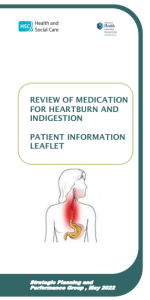The below information relates to heartburn and reflux in adults.
Resources for children with reflux that have been prescribed a Proton Pump Inhibitor (PPI) – please see links to the right.
To view the Review of Medication for Heartburn and Indigestion leaflet in pdf form please click here.

Review of Medication for Heartburn and Indigestion
What can I do to help with my symptoms?
Lifestyle advice for helping with symptoms:
- Don’t smoke, see Stop Smoking (stopsmokingni.info)
- Eat your evening meal well before bedtime and eat at regular times.
- Raise the head of the bed by 15 to 20cm.
- Avoid becoming over-weight. Try to lose weight if you are over-weight. Avoid a lot of caffeine, fats and alcohol.
- Do not regularly drink more than 14 units of alcohol per week. If you are struggling with alcohol seek advice from a healthcare professional.
- Avoid foods you associate with symptoms.
- Avoid tight belts or clothing.
- Avoid bending down or lying flat after meals.
What is a PPI?
PPIs, or proton pump inhibitors, are a group of medicines that are used to reduce the amount of acid that your stomach makes. Symptoms of acid production are known as heartburn (a burning pain felt behind the breastbone) and indigestion (discomfort or pain in the upper abdomen or chest).
By lowering the acid level, they allow your body to heal any inflammation or ulcers that you might have, usually within 8 weeks of starting treatment.
You will have been given one of the following PPIs:
- Lansoprazole
- Omeprazole
- Pantoprazole
- Rabeprazole
- Esomeprazole
How long should I take my PPI for?
Manufacturers recommend them for short-term use for many patients. Many people find after 4-8 weeks, (56 days), of treatment their symptoms are better and they can stop taking their PPI.
In some cases they may need to be taken long-term on the advice of your doctor.
Why should I stop my PPI?
Remember that most ulcers or inflamed tissues in the stomach are healed within 56 days of starting treatment.
Long-term use is known to increase the risk of fracture (hip, wrist and spine) and low levels of magnesium in the blood.
It has also been suggested that reducing acid could increase bacterial growth and can also interfere with the absorption of Vitamin B12, which is needed to keep the skin, blood, hair and nervous system healthy.
You should only be taking PPIs long-term if there is a definite need, which your healthcare professional will discuss with you.
What happens when I take my PPI for more than 56 days?
Studies have shown that after 56 days, your body will try to make more acid to compensate for the tablets.
It will make about 80% more acid than when you first took a PPI. This is why you may get worse heartburn or indigestion when you try to stop.
How will I stop my PPI?
Your healthcare professional will recommend one of three options:
- Stop taking your PPI: You may be advised to take an antacid and/or alginate if you still have symptoms e.g. Peptac liquid. An antacid neutralises acid in your stomach and an alginate prevents acid refluxing back up into your oesophagus (food pipe).
- Take your PPI only when needed: Take your medication only on the days you have symptoms.
- Reduce your PPI dose: If you have taken your PPI for more than 56 days your healthcare professional may decide to reduce your dose first for a few weeks before stopping it.
What happens if my symptoms return?
Some people find that when they stop taking their PPI, their symptoms return and may even seem worse than before they started treatment. This is because if you take a PPI for more than a few weeks, your stomach will try to increase its ability to make acid. This means that for a while after you stop taking your PPI, the acid levels in your stomach may be higher than before you started treatment.
These are called rebound symptoms and they can last about 2 weeks. Please note while they
can be unpleasant they are only temporary. Your healthcare professional will advise on ways to help with heartburn and indigestion that can happen when you try to stop a PPI. They may recommend a different type of medicine called an alginate and/or antacid as discussed previously.
What do I do if I develop problems?
Contact your healthcare professional if:
- Your symptoms get worse or do not improve.
- You experience vomiting, especially if this contains material that looks like blood or coffee grounds.
- Your bowel movements are dark and sticky.
- Swallowing is difficult or painful.
- You have unexplained weight loss.
SEEK URGENT MEDICAL ATTENTION IF YOU EXPERIENCE CHEST PAIN THAT GETS WORSE WITH OR AFTER EXERCISE, OR PAIN THAT GOES INTO YOUR ARM OR LEFT SHOULDER AS THIS MAY INDICATE A HEART PROBLEM.
